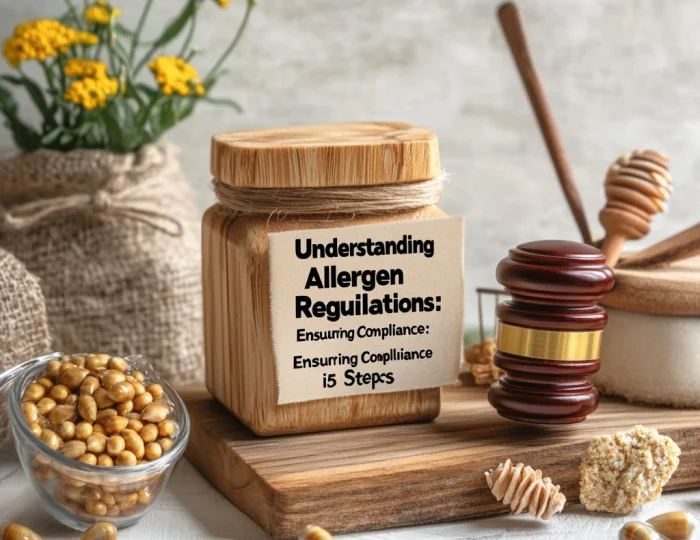
Food allergens are a significant concern for many consumers, and as a food business, it’s vital to understand and comply with allergen regulations to ensure the safety of your products. Neglecting these regulations can lead to severe consequences, including legal action, product recalls, and damage to your brand’s reputation. To help you navigate these regulations and stay compliant, here are five key steps you should follow.
1. Know the Regulations
The first step in ensuring compliance with allergen regulations is to familiarize yourself with the relevant laws and standards. In the United States, the Food Allergen Labeling and Consumer Protection Act (FALCPA) mandates that any packaged food product containing one or more of the major food allergens must clearly state this on the label. The major allergens, as defined by FALCPA, include:
- Milk
- Eggs
- Fish
- Crustacean shellfish
- Tree nuts
- Wheat
- Peanuts
- Soybeans
If your business operates internationally or exports products, you must also be aware of and comply with allergen regulations in other countries, as these may vary.
2. Implement Good Manufacturing Practices (GMPs)
Good Manufacturing Practices (GMPs) are essential guidelines that help ensure the safety and quality of food products. When it comes to allergens, adhering to GMPs involves:
- Segregating allergens from non-allergens within the production facility.
- Using dedicated equipment for producing allergen-containing products.
- Thoroughly cleaning and sanitizing equipment between production runs to prevent cross-contact.
- Training all employees on allergen awareness, proper handling procedures, and the importance of preventing cross-contamination.
Following GMPs not only minimizes the risk of allergen contamination but also reinforces your commitment to food safety.
3. Conduct Thorough Ingredient Checks
One of the leading causes of allergen-related recalls is the presence of undeclared allergens in a product. To prevent this, it’s crucial to conduct thorough checks of all ingredients used in your recipes. This process should include:
- Verifying that all ingredients are accurately labeled.
- Ensuring that any allergens present are clearly identified.
- Double-checking ingredient lists for accuracy before use.
- Communicating with suppliers to confirm the absence of cross-contamination risks.
Staying informed about any changes in ingredients or potential recalls is also important to ensure that your products remain safe and compliant.
4. Label Your Products Accurately
Accurate labeling is essential for effectively communicating allergen information to consumers. Your product labels should:
- List all ingredients, including allergens, in a clear and legible format.
- Use consistent terminology across all products (e.g., specifying “milk” instead of “casein”).
- Highlight allergens, either by bolding them or placing them in a separate “Contains” statement.
- Include any precautionary statements, such as “may contain” if there is a risk of cross-contact.
By providing clear and accurate labels, you empower consumers to make informed decisions and protect those with food allergies.
5. Review and Update Regularly
Allergen regulations and best practices can change over time. To maintain compliance, it’s essential to regularly review and update your processes, labels, and training programs. This includes:
- Keeping up to date with changes in allergen regulations and industry standards.
- Periodically auditing your production processes and facilities to ensure ongoing compliance with GMPs.
- Continuously educating and training your staff on the importance of allergen management.
- Monitoring any changes in supplier practices or ingredient formulations that could affect allergen content.
By staying proactive, you can minimize the risk of non-compliance and ensure that your food products remain safe for all consumers, including those with allergies. The experts at Juris Law Group can help you understand allergen regulations and ensure that you are in compliance.
